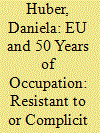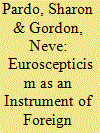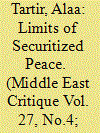|
|
|
Sort Order |
|
|
|
Items / Page
|
|
|
|
|
|
|
| Srl | Item |
| 1 |
ID:
169451


|
|
|
|
|
| Summary/Abstract |
This article focuses on the role the EU has played in the normalization of the 50-year long Israeli occupation of the Palestinian Territory. Has it resisted the occupation, challenging its normalization, or has it been complicit in it, thus contributing to it? To answer this question, the article proceeds in two steps. Firstly, it describes the ‘occupation’ through an inductive approach that reconstructs its structure through how it is experienced and described by key Israeli, Palestinian, and European human rights organizations active in the field, namely as a continuously expanding legal and territorial structure of domination. Secondly, it then juxtaposes the occupation so conceptualized with EU discursive and policy practices on the multilateral, bilateral, and unilateral levels. It reveals that, besides the widely noted discourse–practice gap related to the territorial structure of control, there is also a practice–discourse gap related to the legal structure of control, but which is silenced in EU discourse although partially addressed in its practice. The EU has been both complicit in and resistant to the occupation and therefore its role in the normalization of the occupation has been ambiguous.
|
|
|
|
|
|
|
|
|
|
|
|
|
|
|
|
| 2 |
ID:
169454


|
|
|
|
|
| Summary/Abstract |
This article advances three arguments about Euroscepticism. First, using Israel as a case study we describe its alliances with Eurosceptic political actors, claiming that while each side hopes to benefit from these alliances to advance particular interests, the attraction among the actors are based on ideological affinities that do not align with the norms informing EU policies. If these norms become more contested, it may make it more difficult to construct a ‘normative power’-based approach in EU foreign policy. Second, we reveal how third parties can use Euroscepticism as an instrument for shaping EU foreign policy. Finally, we expose how this strategy produces a political paradox. By allowing itself to become an instrument deployed by a third party, the Eurosceptic member state also agrees to be pushed back into the fold of the EU apparatus, thus reconstituting itself as an internal actor, one which has stakes in the process and is willing to play by the rules of the game.
|
|
|
|
|
|
|
|
|
|
|
|
|
|
|
|
| 3 |
ID:
169450


|
|
|
|
|
| Summary/Abstract |
The Israeli-Palestinian conflict, or the Israeli-Arab conflict/the conflict in the Middle East, as it was called in official EC/EU language all the way up to the 2000s, presented what was widely perceived in Europe to be a golden opportunity for the EC to unite its foreign policy in the late 1960s and early 1970s. However, as important that goal was, many European politicians—from left to right—simultaneously saw an equally golden opportunity for the EC to contribute to help resolve the conflict. The EC/EU’s self-perceived ‘special,’ ‘moral,’ ‘unique’ and ‘distinctive’ role as a peace-builder is one of the defining features of its 50-years involvement in the conflict. Another defining feature during these five decades of EC/EU involvement in the conflict is the centrality of the conflict for instability/stability in the wider Middle East. There are many references in the Bulletin of the EC/EU describing the conflict as lying at the heart of continuing tension in the Near East or being of the utmost importance to Europe and to the whole world.
|
|
|
|
|
|
|
|
|
|
|
|
|
|
|
|
| 4 |
ID:
169448


|
|
|
|
|
| Summary/Abstract |
2017 marked the 50th anniversary of the 1967 war and of Israel’s occupation of what the European Union (EU) considers, in accordance with international law, to be Palestinian and Syrian territories. Almost as long is the involvement of the EU in the conflict, beginning with the formation of the European Political Cooperation (EPC) agreement in 1970.1 This makes the Israeli-Palestinian conflict one of the longest, sustained cases of active EU involvement in world politics. In the EU’s 2003 security strategy, resolution of the Israeli-Palestinian conflict was defined as a ‘a strategic priority for Europe’ and one of the keys for ‘dealing with other problems in the Middle East.’2
|
|
|
|
|
|
|
|
|
|
|
|
|
|
|
|
| 5 |
ID:
169452


|
|
|
|
|
| Summary/Abstract |
Since the Oslo Accords came into force in 1993, the European Union (EU) and its individual member-states have invested billions of Euros, with a view to establishing the basis for an independent and sovereign Palestinian state. As Israel’s colonization of the Palestinian West Bank has progressed, Palestinian statehood has become little more than a myth. As the state-building process has atrophied, securitization has found a renewed impetus, being elevated at the expense of initiatives that seek to promote democratization. This article argues that, far from being a neutral process grounded within the building of capacities, Security Sector Reform (SSR) has strengthened the foundations of Palestinian authoritarianism. In focusing upon the development of the EU’s police mission in the West Bank (EUPOL COPPS), this article argues that EU-sponsored ‘reform’ has contributed directly to the ‘professionalization’ of Palestinian authoritarianism. The article therefore suggests that the EU consistently has failed to acknowledge the political implications that extend from its technical mandate and interventions. The EU has become, to the extent that its interventions extend Israel’s colonial project, part of the problem. In concluding, the article offers an assessment of the decade-long EUPOL COPPS (The European Union Police Mission for the Palestinian Territories) commitment, with a view to developing key lessons and recommendations that can inform future EU interventions.
|
|
|
|
|
|
|
|
|
|
|
|
|
|
|
|
| 6 |
ID:
169453


|
|
|
|
|
| Summary/Abstract |
After Tony Blair resigned as the United Kingdom’s prime minister in June 2007, he was appointed as the official envoy of the Quartet on the Middle East. His appointment was marred with controversy not the least with regard to his suitability for the role and his performance as peace envoy, with many observers questioning his ethical credentials. The EU along with the US, Russia and the UN make up the Quartet and funded Blair’s office until 2012. With the US and the EU as the key regional players in this conflict, Blair became an embodiment of these players in this specific role. This article employs critical discourse analysis to nuance whether Tony Blair’s role as Middle East envoy, and as an embodiment of the EU, was indeed a legitimate one in terms of achieving at least some of its stated aims, particularly those pertaining to the Palestinians who live under Israel’s colonization. It does so by engaging with the work of John Street and more broadly the literature on celebrity politicians and by counterbalancing this conceptual framework with a critical reflection on Blair’s time as Middle East envoy.
|
|
|
|
|
|
|
|
|
|
|
|
|
|
|
|
| 7 |
ID:
169449


|
|
|
|
|
| Summary/Abstract |
This article provides a theoretical perspective on the question of how EU-Israeli/Palestinian relations should be conceived 50 years after the occupation. The article sets out how a critical social theory of normative power could be seen as a way both of analyzing and changing these relations. According to Craig Calhoun, critical social theory should be seen as an ‘interpenetrating body of work which demands and produces critique… [that] depends on some manner of historical understanding and analysis.’ The normative power approach represents a critical social theory in that it seeks to be explanatory, practical, and normative, all at the same time. The article suggests how these criteria may be applied to the study of EU-Israeli/Palestinian relations and their consequences, 50 years after the occupation.
|
|
|
|
|
|
|
|
|
|
|
|
|
|
|
|
|
|
|
|
|